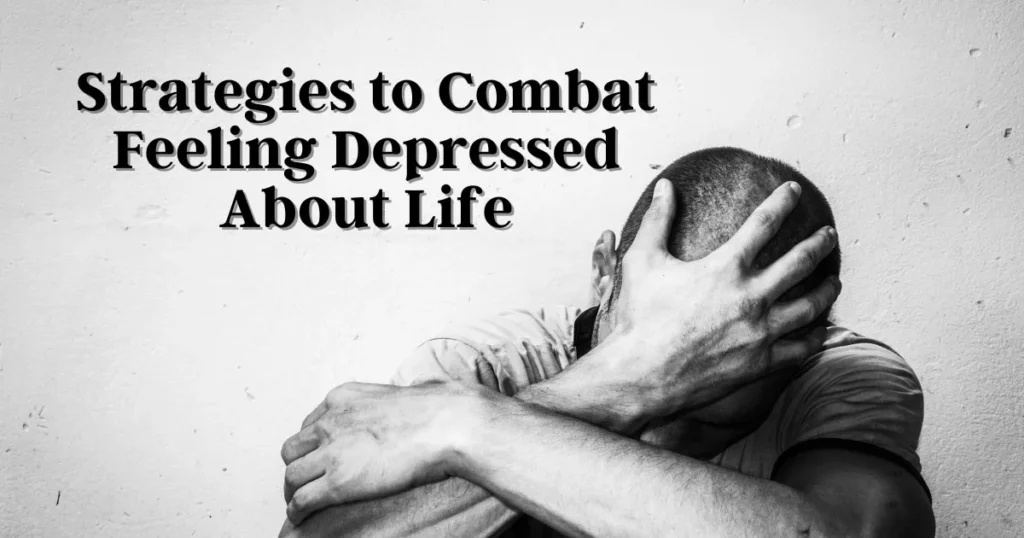Last updated on March 13th, 2024 at 08:43 am
Have you ever found yourself in the grip of sadness that doesn’t seem to go away, perhaps even leading to suicidal thoughts?
It is not just a temporary emotion; but a serious medical condition that can quickly affect someone’s life, leading to a constant feeling of despair and disinterest in daily activities, greatly affecting their life quality. Depression is much more common than what we might think. According to the World Health Organization, approximately 280 million people have depression. Left ignored and untreated, it may last for prolonged periods – months or even years.
The first step to recovery happens when a person recognizes the problem and seeks help. You need to know that you are not alone in this journey, and help is more accessible than ever, including talking therapies.
In this article, we will discuss the concept of depression, its types, symptoms, and effective strategies to deal with it. The purpose is not just to educate but also to give action for people in need.
Understanding Depression

Clinical depression can take various forms, with symptoms varying in intensity and duration. Here are some common types of depression you might come across.
Major Depression
A persistently low mood that doesn’t change for at least two weeks might indicate that you experience depressive feelings. You might have this type if you feel depressed most of the time for several days of the week.
Here are some symptoms to look out for:
- Sudden weight loss
- Difficulty in falling or staying asleep
- Feeling tired
- Feeling hopeless
- Loss of interest in activities you once enjoyed
- Trouble with concentration
Persistent Depressive Disorder
True to its name, this form of depression lingers for two years or more. While the feelings of sadness and hopelessness may not be as severe as major depression, they can still negatively affect everyday life activities.
Bipolar Disorder
Also called manic depression, is marked by extreme mood transitions – Switching between very low (depressive) and very high (manic) phases.
Peripartum (Postpartum) Depression
Particularly affects women following childbirth. Severe hormonal changes can lead to depression that extends beyond the initial weeks.
Some common signs include:
- Loss of interest in previously enjoyed activities
- Feelings of anger, irritability, or exhaustion
- Anxiety or panic attacks
Sadness vs. Depression: Knowing the Difference

Everyone feels sad or low at some point. It’s a normal part of life – a natural reaction to losses, disappointments, and challenging situations. But, it’s crucial to understand that sadness is not depression.
Feelings of sadness often dissipate as time passes or when circumstances change, and you move on with your daily life. You may lose your job today and feel sad, but a good night’s sleep or a pep talk with a good friend, and you’re back to your day-to-day activities.
On the other hand, Depression is a cloud that hangs low and doesn’t lift, regardless of external circumstances. It’s a mental health condition that should be addressed with proper care, patience, and professional help.
Self-Care Strategies for Battling Depression

Sleep
Set a regular sleep schedule. Make your bedroom a sanctuary – dark, quiet, and cool. Remove screen time & caffeine intake close to bedtime as a healthy sleep cultivates emotional balance. When we sleep, our bodies recharge, which includes rejuvenating our mood-regulating chemicals.
Nutritious Diet
Do not cave to the ‘binge-then-starve’ cycle. Stock your pantry with nutritious foods – fruits, veggies, lean proteins, and whole grains. Having a healthy diet can help maintain our mood at an optimal level.
Exercise
Exercise has been proven to stimulate the brain to release the ‘feel-good’ chemicals, known as endorphins. Turn ordinary tasks into mini workouts – take the stairs instead of the elevator or do a simple jog every morning? And remember, it’s consistency over intensity.
Mindfulness and Relaxation Techniques
Stress and anxiety can be taxing, leading us to respond in unproductive ways. However, several relaxation techniques can help manage these troubling feelings.
Consider this story I found on YouTube, about a woman who found comfort from depression through meditation.
Meditation
Regular meditation not only brings peace and calm to your daily life but also serves as a remedy for overall well-being that can produce a positive long-term effect.
Stretch Your Way To Calm
Yoga offers a harmonious blend of stretching and breathing that helps alleviate stress and anxiety.
Deep Breathing
Commit to practicing simple deep breathing exercises. This will help you feel relaxed and reduce stress.
Connecting with Others
Strong social support networks are critical in dealing with life’s numerous challenges. They create a sense of belonging and self-worth, key resilience factors.
Lean On Your Loved Ones
Reach out to your friends, or family, or join a therapy group. You might be surprised to find both attentive ears and wise advice from people who care for you.
Additional Resources and Support

Don’t forget, you’re never alone on this journey. There are several organizations, hotlines, and communities that provide a supportive hand when needed. These groups offer empathetic ears and hearts that understand.
Check out these links or find the hotlines in your area for immediate support.
- Online Therapy That Works
- HelpGuide
- Nami.org
- SAMHSA
- International Mental Health Support
- United for Global Mental Health
Mental Health Support Group
Join active forums like the Mental Health Forum and the Facebook Mental Health Support Group. They are incredibly welcoming, offering advice to those going through similar struggles. You might also find solace in Reddit’s Mental Health Support Group, where anonymity often lends itself to candid conversations.
If professional help is a step you’ve considered or are considering, understanding the process and available options can help. However, the first step should always be a mental health professional like a psychologist or psychiatrist. They can conduct a thorough diagnosis, including a physical exam, psychiatric evaluation, and possibly lab tests.
There are several choices when it comes to treatments, from therapy to medication, or a combination of both. This diversity means that there’s likely the perfect fit for your needs and lifestyle. The critical element here is being open to the exploration process.
Conclusion
Depression can be managed by understanding its signs and employing self-care strategies. Always remember, it’s more than okay to ask for help, whether it’s reaching out to loved ones or consulting a nearby psychiatrist.
If you find this blog helpful, consider subscribing to Smiat Blogs. Get access to a wealth of information and inspiring stories on mental health to support you every step of the way.
As you continue this journey to daily self-improvement, here’s a parting thought: In the words of Christopher Robin to Winnie the Pooh, “You are braver than you believe, stronger than you seem, and smarter than you think“.


Pingback: My Job is Making Me Depressed But I Can't Quit: What To Do Next